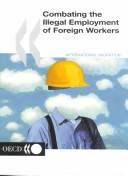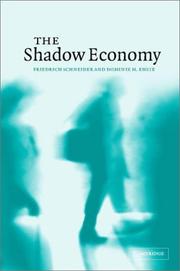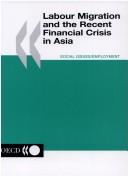| Listing 1 - 10 of 12 | << page >> |
Sort by
|

ISBN: 926418239X 9264185151 Year: 2000 Publisher: Paris, Cedex, France : OECD,
Abstract | Keywords | Export | Availability | Bookmark
 Loading...
Loading...Choose an application
- Reference Manager
- EndNote
- RefWorks (Direct export to RefWorks)
The fight against the illegal entry, residence and employment of foreigners is one of the key priorities of the immigration policies of the OECD countries. This irregular migration continues to persist, albeit at different levels for different receiving countries, both in countries that have expressed a political will to manage migration flows more effectively and to fight against the trafficking of labour, and in those that continue to receive a large number of immigrants every year as part of an active policy to recruit permanent migrant workers. In the light of the growing role of trafficking networks and their increasingly active involvement in moving labour across international boundaries, enhanced co-operation at both national and international levels is required to develop policies for preventing and combating the employment of foreigners in an irregular situation. In particular, whatever is done to combat the hiring of illegal immigrants must address the problem of undeclared work in general, and not just the employment of illegal immigrants per se. Better information on the risks and penalties involved in the use of illegal labour should also be directed at both employers and workers in industries where these illegal practices are prevalent, but also at employers that resort to the use of undeclared labour only on an occasional basis and at sending countries. Various specific measures adopted by a number of Member countries, such as the requirement to notify relevant government agencies prior to hiring, fiscal incentives for the employment of legal workers or the streamlining of hiring formalities, might be applied in a larger number of countries. The forging of partnerships between the relevant government agencies and employers’ and employees’ associations in each country should also be encouraged, together with the extension of international co-operation to control and manage immigration flows more effectively.
Emigration and immigration law -- OECD countries. --- Foreign worker certification -- OECD countries. --- Foreign workers -- OECD countries. --- Illegal aliens -- OECD countries. --- Illegal aliens --- Aliens --- Aliens, Illegal --- Illegal immigrants --- Illegal immigration --- Undocumented aliens --- Alien detention centers --- Human smuggling --- Legal status, laws, etc. --- Undocumented immigrants --- Enemy aliens --- Expatriates --- Foreign population --- Foreign residents --- Foreigners --- Non-citizens --- Noncitizens --- Resident aliens --- Unauthorized immigrants --- Unnaturalized foreign residents --- Persons --- Children of illegal aliens --- Illegal alien children --- Irregular migration --- Unauthorized immigration --- Undocumented immigration --- Women illegal aliens --- Emigration and immigration --- Noncitizen detention centers

ISBN: 0520204840 0520204859 0520917677 0585331197 9780520917675 9780585331195 9780520204843 9780520204850 Year: 1999 Publisher: Berkeley, Calif. University of California Press
Abstract | Keywords | Export | Availability | Bookmark
 Loading...
Loading...Choose an application
- Reference Manager
- EndNote
- RefWorks (Direct export to RefWorks)
In early 1920 in Hawaii, Japanese sugar cane workers, faced with spiraling living expenses, defiantly struck for a wage increase to 1.25 per day. The event shook the traditional power structure in Hawaii and, as Masayo Duus demonstrates in this book, had consequences reaching all the way up to the eve of World War II. By the end of World War I, the Hawaiian Islands had become what a Japanese guidebook called a "Japanese village in the Pacific," with Japanese immigrant workers making up nearly half the work force on the Hawaiian sugar plantations. Although the strikers eventually capitulated, the Hawaiian territorial government, working closely with the planters, cracked down on the strike leaders, bringing them to trial for an alleged conspiracy to dynamite the house of a plantation official. And to end dependence on Japanese immigrant labor, the planters lobbied hard in Washington to lift restrictions on the immigration of Chinese workers. Placing the event in the context of immigration history as well as diplomatic history, Duus argues that the clash between the immigrant Japanese workers and the Hawaiian oligarchs deepened the mutual suspicion between the Japanese and United States governments. Eventually, she demonstrates, this suspicion led to the passage of the so-called Japanese Exclusion Act of 1924, an event that cast a long shadow into the future. Drawing on both Japanese- and English-language materials, including important unpublished trial documents, this richly detailed narrative focuses on the key actors in the strike. Its dramatic conclusions will have broad implications for further research in Asian American studies, labor history, and immigration history.
Strikes and lockouts --- Aliens --- Japanese --- Emigration and immigration law --- Labor & Workers' Economics --- Business & Economics --- History --- Legal staus, laws, etc --- Legal status, laws, etc --- Oahu (Hawaii) --- United States --- Japan --- Social conditions. --- Foreign relations --- E-books --- Ethnology --- Enemy aliens --- Expatriates --- Foreign citizens (Aliens) --- Foreign population --- Foreign residents --- Foreigners --- Noncitizens --- Resident aliens --- Unnaturalized foreign residents --- Persons --- Deportees --- Exiles --- Immigrants --- Refugees --- Combinations of labor --- Lockouts --- Work stoppages --- Direct action --- Labor disputes --- Strikebreakers --- Legal status, laws, etc. --- Hawaii --- Illegal aliens --- Illegal immigrants --- Non-citizens --- Unauthorized immigrants --- Undocumented aliens --- Undocumented immigrants
Book
ISBN: 2804409007 9782804409005 Year: 2002 Volume: 36 Publisher: Bruxelles Larcier
Abstract | Keywords | Export | Availability | Bookmark
 Loading...
Loading...Choose an application
- Reference Manager
- EndNote
- RefWorks (Direct export to RefWorks)
1. Dispositions générales.- 2. Dispositions complémentaires et rogatoires.- 3. Voies de recours.- 4. Dispositions pénales.
Status of persons --- Human rights --- Administrative law --- International private law --- Belgium --- Droit des étrangers --- Jurisprudence --- Rechtspraak --- Vreemdelingenrecht --- Aliens --- Etrangers --- Droit --- History --- 351.756 <493> --- BE / Belgium - België - Belgique --- 342.7 --- V31 - Droit international privé - Internationaal privaatrecht --- INTERNATIONAAL PRIVAATRECHT V 31 --- Vreemdelingenrecht. Statuut van de vreemdeling. Visa--België --- Grondrechten. Politieke rechten. Rechten van de mens. Grondwettelijke vrijheden. Bescherming van de enkeling. --- History. --- 351.756 <493> Vreemdelingenrecht. Statuut van de vreemdeling. Visa--België --- Enemy aliens --- Expatriates --- Foreign citizens (Aliens) --- Foreign population --- Foreign residents --- Foreigners --- Noncitizens --- Resident aliens --- Unnaturalized foreign residents --- Persons --- Deportees --- Exiles --- Immigrants --- Refugees --- Grondrechten. Politieke rechten. Rechten van de mens. Grondwettelijke vrijheden. Bescherming van de enkeling --- Legal status, laws, etc. --- Illegal aliens --- Illegal immigrants --- Non-citizens --- Unauthorized immigrants --- Undocumented aliens --- Undocumented immigrants --- Aliens - Belgium --- Aliens - Belgium - History
Book
ISBN: 907012596X 9789070125967 Year: 1997 Publisher: Amsterdam IBFD publications
Abstract | Keywords | Export | Availability | Bookmark
 Loading...
Loading...Choose an application
- Reference Manager
- EndNote
- RefWorks (Direct export to RefWorks)
Taxation --- Tax planning --- Droit fiscal --- Planification fiscale --- Law and legislation --- Business enterprises, Foreign --- Aliens --- fiscalite --- droit fiscal --- conventions fiscales internationales --- grand duche de luxembourg --- LU / Luxembourg - Luxemburg --- 348.5 --- 336.201 --- fiscaliteit --- fiscaal recht --- internationale belastingverdragen --- groothertogdom luxemburg --- Belastingsrecht. --- Fiscaal regime: structuur en evolutie. Fiscale hervorming. --- Tax avoidance --- Tax saving --- Duties --- Fee system (Taxation) --- Tax policy --- Tax reform --- Taxation, Incidence of --- Taxes --- Foreign business enterprises --- Enemy aliens --- Expatriates --- Foreign citizens (Aliens) --- Foreign population --- Foreign residents --- Foreigners --- Noncitizens --- Resident aliens --- Unnaturalized foreign residents --- Fiscaal regime: structuur en evolutie. Fiscale hervorming --- Belastingsrecht --- Legal status, laws, etc. --- Estate planning --- Finance, Public --- Revenue --- Business enterprises --- Persons --- Deportees --- Exiles --- Immigrants --- Refugees --- Illegal aliens --- Illegal immigrants --- Non-citizens --- Unauthorized immigrants --- Undocumented aliens --- Undocumented immigrants --- Taxation - Law and legislation - Luxembourg. --- Tax planning - Luxembourg. --- Business enterprises, Foreign - Taxation - Law and legislation - Luxembourg. --- Aliens - Taxation - Law and legislation - Luxembourg.
Book
ISBN: 0801451213 0801478146 080146577X 1336207930 9780801465772 0801465338 9780801451218 9780801478147 Year: 2013 Publisher: Ithaca, N.Y. ILR Press
Abstract | Keywords | Export | Availability | Bookmark
 Loading...
Loading...Choose an application
- Reference Manager
- EndNote
- RefWorks (Direct export to RefWorks)
"In Conflicting Commitments, Shannon Gleeson goes beyond the debate over federal immigration policy to examine the complicated terrain of immigrant worker rights. Federal law requires that basic labor standards apply to all workers, yet this principle clashes with increasingly restrictive immigration laws and creates a confusing bureaucratic terrain for local policymakers and labor advocates. Gleeson examines this issue in two of the largest immigrant gateways in the country: San Jose, California, and Houston, Texas. Conflicting Commitments reveals two cities with very different approaches to addressing the exploitation of immigrant workers--both involving the strategic coordination of a range of bureaucratic brokers, but in strikingly different ways. Drawing on the real life accounts of ordinary workers, federal, state, and local government officials, community organizers, and consular staff, Gleeson argues that local political contexts matter for protecting undocumented workers in particular. Providing a rich description of the bureaucratic minefields of labor law, and the explosive politics of immigrant rights, Gleeson shows how the lessons learned from San Jose and Houston can inform models for upholding labor and human rights in the United States"--Publisher's Web site.
Foreign workers --- Employee rights --- Illegal aliens --- Legal status, laws, etc. --- Alien labor --- Aliens --- Foreign labor --- Guest workers --- Guestworkers --- Immigrant labor --- Immigrant workers --- Migrant labor (Foreign workers) --- Migrant workers (Foreign workers) --- Aliens, Illegal --- Illegal immigrants --- Illegal immigration --- Undocumented aliens --- Employees --- Labor rights --- Rights of employees --- Employment --- Law and legislation --- Civil rights --- Alien detention centers --- Human smuggling --- Labor laws and legislation --- Employee rules --- Legal status, laws, etc --- E-books --- Undocumented immigrants --- Noncitizen labor --- Noncitizens --- Enemy aliens --- Expatriates --- Foreign population --- Foreign residents --- Foreigners --- Non-citizens --- Resident aliens --- Unauthorized immigrants --- Unnaturalized foreign residents --- Persons --- Illegal immigration. --- Children of illegal aliens --- Illegal alien children --- Irregular migration --- Unauthorized immigration --- Undocumented immigration --- Women illegal aliens --- Emigration and immigration --- Noncitizen detention centers
Book
ISBN: 1283848198 1442220694 9781442220690 9781442220683 1442220686 Year: 2012 Publisher: Lanham Rowman & Littlefield Publishers
Abstract | Keywords | Export | Availability | Bookmark
 Loading...
Loading...Choose an application
- Reference Manager
- EndNote
- RefWorks (Direct export to RefWorks)
"Debt is the hidden engine driving undocumented migration to the United States. So argues David Stoll in this powerful chronicle of migrants, moneylenders, and swindlers in the Guatemalan highlands, one of the locales that, collectively, are sending millions of Latin Americans north in search of higher wages. As an anthropologist, Stoll has witnessed the Ixil Mayas of Nebaj grow in numbers, run out of land, and struggle to find employment. Aid agencies have provided microcredits to turn the Nebajenses into entrepreneurs, but credit alone cannot boost productivity in crowded mountain valleys, which is why many recipients have invested the loans in smuggling themselves to the United States. Back home, their remittances have inflated the price of land so high that only migrants can afford to buy it. Thus, more Nebajenses have felt obliged to borrow the large sums needed to go north. So many have done so that, even before the Great Recession hit the U.S. in 2008, many were unable to find enough work to pay back their loans, triggering a financial crash back home. Now migrants and their families are losing the land and homes they have pledged as collateral. Chain migration, moneylending, and large families, Stoll proposes, have turned into pyramid schemes in which the poor transfer risk and loss to their near and dear."- from Amazon.com
Microfinance --- Ixil Indians --- Quiché Indians --- Emigrant remittances --- Undocumented immigrants --- Immigrant remittances --- Remittances, Emigrant --- Foreign exchange --- K'iche' Indians --- Quichés --- Indians of Central America --- Mayas --- Micro-finance --- Microcredit --- Microenterprise lending --- Microlending --- Financial services industry --- Small business --- Economic conditions. --- Finance --- Nebaj (Guatemala) --- Santa María Nebaj (Guatemala) --- Emigration and immigration --- Economic aspects. --- Illegal aliens --- Aliens --- Aliens, Illegal --- Illegal immigrants --- Illegal immigration --- Undocumented aliens --- Alien detention centers --- Human smuggling --- Economic conditions --- Legal status, laws, etc. --- E-books --- Enemy aliens --- Expatriates --- Foreign population --- Foreign residents --- Foreigners --- Non-citizens --- Noncitizens --- Resident aliens --- Unauthorized immigrants --- Unnaturalized foreign residents --- Persons --- Illegal immigration. --- Children of illegal aliens --- Illegal alien children --- Irregular migration --- Unauthorized immigration --- Undocumented immigration --- Women illegal aliens --- Noncitizen detention centers
Book
ISBN: 9063213751 Year: 1986 Volume: vol 4 Publisher: Antwerpen
Abstract | Keywords | Export | Availability | Bookmark
 Loading...
Loading...Choose an application
- Reference Manager
- EndNote
- RefWorks (Direct export to RefWorks)
Tax law --- Belgium --- Belastingen --- Droit fiscal --- Fiscaal recht --- Impôts --- 351.713*12 <493> --- Foreign executives --- -Taxation of aliens --- -Income tax --- -Aliens --- -351.713 <493> --- 336.21 <493> --- 336.21-057.56 <493> --- fiscaal recht --- berekening van de belasting --- belasting van niet-inwoners --- belgie --- BE / Belgium - België - Belgique --- 336.212.1 --- 658.334 --- 339.235 --- S02 - Impôts des personnes morales - Rechtspersonenbelastingen --- 336.2 --- 658.3-052.2 --- P493 --- Aliens --- Enemy aliens --- Expatriates --- Foreign citizens (Aliens) --- Foreign population --- Foreign residents --- Foreigners --- Noncitizens --- Resident aliens --- Unnaturalized foreign residents --- Persons --- Deportees --- Exiles --- Immigrants --- Refugees --- Personal income tax --- Taxable income --- Taxation of income --- Direct taxation --- Internal revenue --- Progressive taxation --- Tithes --- Wages --- Taxation of aliens --- Executives --- Inkomstenbelasting--België --- Taxation --- -Law and legislation --- -Taxation --- -droit fiscal --- calcul de l'impot --- impot des non residents --- belgique --- Belastingen op de bedrijfsinkomsten --- Beroepsvorming en -oriëntatie. Menselijke investeringen. Menselijk kapitaal. --- Inkomens van bedienden, kaderleden en ambtenaren. --- fiscaliteit - belastingen - retributies - belastinghervorming --- kaderpersoneel (zie ook 65.012.4-05, 658.386.4) --- België --- Legal status, laws, etc. --- #A9705E --- |01322/B --- Income tax --- Law and legislation --- 351.713*12 <493> Inkomstenbelasting--België --- 351.713 <493> --- droit fiscal --- Inkomens van bedienden, kaderleden en ambtenaren --- Beroepsvorming en -oriëntatie. Menselijke investeringen. Menselijk kapitaal --- Illegal aliens --- Illegal immigrants --- Non-citizens --- Unauthorized immigrants --- Undocumented aliens --- Undocumented immigrants

ISBN: 0521814081 0521891078 0511120559 0511042469 0511306040 0511148852 0511493592 1280159685 051104559X 1107133513 9780511045592 9781280159688 9780511120558 9780511042461 9780511493591 9786610159680 6610159688 9780511148859 9780521814089 9780511306044 9781107133518 9780521891073 Year: 2002 Publisher: Cambridge Cambridge University Press
Abstract | Keywords | Export | Availability | Bookmark
 Loading...
Loading...Choose an application
- Reference Manager
- EndNote
- RefWorks (Direct export to RefWorks)
Illicit work, social security fraud, economic crime and other shadow economy activities are fast becoming an international problem. Friedrich Schneider and Dominik H. Enste use currency demand, physical input (electricity) method, and the model approach to estimate the size of the shadow economy in 76 developing, transition and OECD-countries. They argue that during the 1990s the average size of a shadow economy varied from 12 per cent of GDP for OECD, to 23 per cent for transition and to 39% for developing countries. They examine the causes and consequences of this development using an integrated approach explaining deviant behaviour, which combines the findings of economic, sociological and psychological research. The authors suggest that increasing taxation, social security contributions, rising state regulatory activities and the decline of the tax morale, are all driving forces behind this growth, especially in OECD-countries. They propose a reform of state institutions to improve the dynamics of the official economy.
Economic structure --- economie souterraine --- fraude --- criminalite --- situation economique --- AA / International- internationaal --- 336.208 --- 343.35 --- Informal sector (Economics) --- 330 --- Hidden economy --- Parallel economy --- Second economy --- Shadow economy --- Subterranean economy --- Underground economy --- Artisans --- Economics --- Small business --- ondergrondse economie --- criminaliteit --- economische toestand --- Grondslag, vereffening, inning en controle van de belastingen. Fiscale fraude. Zwartwerk. Parallelle economie. --- Misdrijven tegen de openbare administratie, de belasting- en administratieve wetgeving. --- Commercial crimes. --- Informal sector (Economics). --- Business enterprises --- Commercial crimes --- Tax evasion --- Illegal aliens --- Welfare fraud --- Fraud --- Management --- Business & Economics --- Industrial Management --- Corrupt practices --- Business, Economy and Management --- Tax evasion. --- Illegal aliens. --- Welfare fraud. --- Fraud. --- Corrupt practices. --- Commercial fraud --- Deceit --- Misrepresentation (Crime) --- Aliens --- Aliens, Illegal --- Illegal immigrants --- Illegal immigration --- Undocumented aliens --- Evasion, Fiscal --- Fiscal evasion --- Tax avoidance --- Tax delinquency --- Tax-dodging --- Tax fraud --- Taxation --- Taxation, Evasion of --- Corporate crime --- Crimes, Financial --- Financial crimes --- Offenses affecting the public trade --- Business organizations --- Businesses --- Companies --- Enterprises --- Firms --- Organizations, Business --- Legal status, laws, etc. --- Evasion --- Deception --- Torts --- Hoaxes --- Impostors and imposture --- Public welfare --- Swindlers and swindling --- Alien detention centers --- Human smuggling --- White collar crimes --- Crime --- Business --- E-books --- Grondslag, vereffening, inning en controle van de belastingen. Fiscale fraude. Zwartwerk. Parallelle economie --- Misdrijven tegen de openbare administratie, de belasting- en administratieve wetgeving --- Undocumented immigrants. --- Undocumented immigrants --- Noncitizens. --- Enemy aliens --- Expatriates --- Foreign population --- Foreign residents --- Foreigners --- Non-citizens --- Noncitizens --- Resident aliens --- Unauthorized immigrants --- Unnaturalized foreign residents --- Persons --- Illegal immigration. --- Undocumented Immigrants --- Children of illegal aliens --- Illegal alien children --- Irregular migration --- Unauthorized immigration --- Undocumented immigration --- Women illegal aliens --- Emigration and immigration --- Noncitizen detention centers

Abstract | Keywords | Export | Availability | Bookmark
 Loading...
Loading...Choose an application
- Reference Manager
- EndNote
- RefWorks (Direct export to RefWorks)
Tax law --- United States --- US / United States of America - USA - Verenigde Staten - Etats Unis --- 336.214 --- 351.713 <73> --- 336.212.4 --- Aliens --- -R03 Droit fiscal comparé - Vergelijkend fiscaal recht --- Corporations, Foreign --- -Double taxation --- -Income tax --- -Personal income tax --- Taxable income --- Taxation of income --- Direct taxation --- Internal revenue --- Progressive taxation --- Tithes --- Wages --- Double taxation --- International taxation (Double taxation) --- Taxation, Double --- Taxation --- Conflict of laws --- Foreign corporations --- Juristic persons, Foreign --- Business enterprises, Foreign --- Corporation law --- International business enterprises --- Investments, Foreign --- Corporations --- Enemy aliens --- Expatriates --- Foreign citizens (Aliens) --- Foreign population --- Foreign residents --- Foreigners --- Noncitizens --- Resident aliens --- Unnaturalized foreign residents --- Persons --- Deportees --- Exiles --- Immigrants --- Refugees --- Belastingstelsel van de genootschappen. --- Fiscaal recht. Belastingsrecht. Overheidsfinancien. Belastingswezen--z.o.{336.2}--Verenigde Staten van Amerika. VSA. USA --- belastingen op de totale inkomsten (Income Tax). --- -Law and legislation --- -Taxation --- -Foreign income --- Law and legislation --- Nationality --- Legal status, laws, etc. --- Income tax --- Foreign income. --- -Belastingstelsel van de genootschappen. --- 351.713 <73> Fiscaal recht. Belastingsrecht. Overheidsfinancien. Belastingswezen--z.o.{336.2}--Verenigde Staten van Amerika. VSA. USA --- R03 Droit fiscal comparé - Vergelijkend fiscaal recht --- Foreign income --- belastingen op de totale inkomsten (Income Tax) --- Belastingstelsel van de genootschappen --- Illegal aliens --- Illegal immigrants --- Non-citizens --- Unauthorized immigrants --- Undocumented aliens --- Undocumented immigrants --- Droit fiscal --- United States of America

ISBN: 9264171738 9786610030682 1280030682 9164180328 Year: 2000 Volume: *6 Publisher: Paris : OECD,
Abstract | Keywords | Export | Availability | Bookmark
 Loading...
Loading...Choose an application
- Reference Manager
- EndNote
- RefWorks (Direct export to RefWorks)
Accompanying a sustained period of economic growth, the flows of labour migrants between the economies of East and South-east Asia grew considerably prior to the recent crisis. These flows have become more diverse and complex rendering necessary the improved monitoring of migration trends and policies in each country as well as bringing forth the need to extend the exchange of expertise and experience between the region's experts and policy makers. What has been the impact of the crisis on national labour markets? How have the different countries modified their approach to the employment of foreign workers? To what extent have foreign workers been affected? These questions are examined in this publication, which identifies the impact of the Asian financial crisis on labour migration and the conditions of migrant workers in the region. In addition to keynote reports on the origins of the crisis and its policy implications, individual case studies on China, Hong Kong (China), Indonesia, Japan, Korea, Malaysia, the Philippines, Singapore and Thailand present detailed analyses of labour migration, the employment of foreign workers and the recent changes in migration policies.
Foreign workers --- Illegal aliens --- Labor market --- Labor mobility --- Labor economics --- Labor unions --- Financial crises --- Travailleurs étrangers --- Immigrants clandestins --- Marché du travail --- Main-d'oeuvre --- Economie du travail --- Syndicats --- Crises financières --- Congresses --- Congresses. --- Congrès --- Mobilité --- Asia --- Asie --- Emigration and immigration --- Economic conditions --- Emigration et immigration --- Conditions économiques --- marche du travail --- migration --- crise monetaire --- asie --- arbeidsmarkt --- migratie --- monetaire crisis --- azie --- Travailleurs étrangers --- Marché du travail --- Crises financières --- Congrès --- Mobilité --- Conditions économiques --- Industrial unions --- Labor, Organized --- Labor organizations --- Organized labor --- Trade-unions --- Unions, Labor --- Unions, Trade --- Working-men's associations --- Labor movement --- Societies --- Central labor councils --- Guilds --- Syndicalism --- Mobility, Labor --- Migration, Internal --- Labor supply --- Labor turnover --- Employees --- Market, Labor --- Supply and demand for labor --- Markets --- Economics --- Aliens --- Aliens, Illegal --- Illegal immigrants --- Illegal immigration --- Undocumented aliens --- Alien detention centers --- Human smuggling --- Alien labor --- Foreign labor --- Guest workers --- Guestworkers --- Immigrant labor --- Immigrant workers --- Migrant labor (Foreign workers) --- Migrant workers (Foreign workers) --- Crashes, Financial --- Crises, Financial --- Financial crashes --- Financial panics --- Panics (Finance) --- Stock exchange crashes --- Stock market panics --- Crises --- Legal status, laws, etc --- Supply and demand --- Legal status, laws, etc. --- Employment --- Asian and Pacific Council countries --- Eastern Hemisphere --- Eurasia --- Undocumented persons --- Noncitizens --- Noncitizen labor --- Children of illegal aliens --- Illegal alien children --- Irregular migration --- Unauthorized immigration --- Undocumented immigration --- Women illegal aliens --- Noncitizen detention centers --- Enemy aliens --- Expatriates --- Foreign population --- Foreign residents --- Foreigners --- Non-citizens --- Resident aliens --- Unauthorized immigrants --- Undocumented immigrants --- Unnaturalized foreign residents --- Persons
| Listing 1 - 10 of 12 | << page >> |
Sort by
|

 Search
Search Feedback
Feedback About UniCat
About UniCat  Help
Help News
News